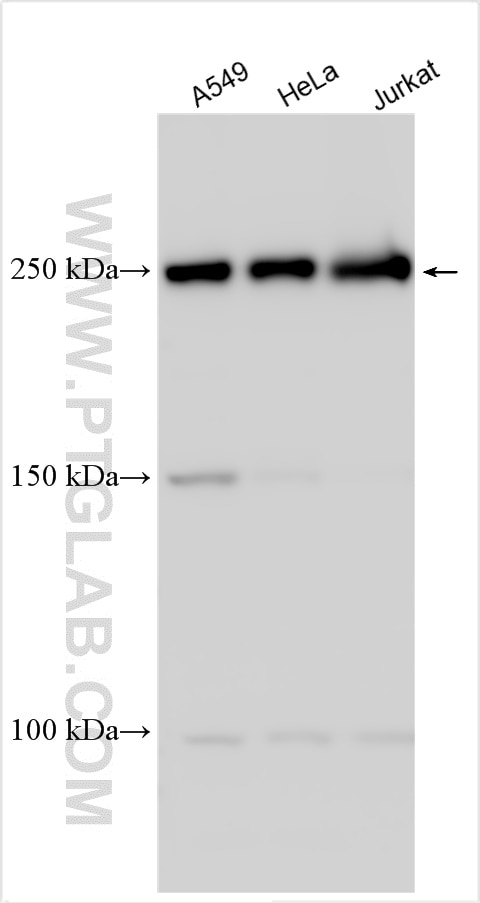Tested Applications
| Positive WB detected in | A549 cells, HeLa cells, Jurkat cells |
Recommended dilution
| Application | Dilution |
|---|---|
| Western Blot (WB) | WB : 1:1000-1:4000 |
| It is recommended that this reagent should be titrated in each testing system to obtain optimal results. | |
| Sample-dependent, Check data in validation data gallery. | |
Product Information
31679-1-AP targets GTF3C1 in WB, ELISA applications and shows reactivity with Human samples.
| Tested Reactivity | Human |
| Host / Isotype | Rabbit / IgG |
| Class | Polyclonal |
| Type | Antibody |
| Immunogen | GTF3C1 fusion protein Ag36117 Predict reactive species |
| Full Name | general transcription factor IIIC, polypeptide 1, alpha 220kDa |
| Observed Molecular Weight | 250 kDa |
| GenBank Accession Number | BC137229 |
| Gene Symbol | GTF3C1 |
| Gene ID (NCBI) | 2975 |
| RRID | AB_3670073 |
| Conjugate | Unconjugated |
| Form | Liquid |
| Purification Method | Antigen affinity Purification |
| UNIPROT ID | Q12789 |
| Storage Buffer | PBS with 0.02% sodium azide and 50% glycerol , pH 7.3 |
| Storage Conditions | Store at -20°C. Stable for one year after shipment. Aliquoting is unnecessary for -20oC storage. 20ul sizes contain 0.1% BSA. |
Background Information
Transcription factor IIIC (TF3C or GTF3C), a component of RNA polymerase III, is a multisubunit complex that binds B box promoter elements. It is involved in the assembly of the transcription complex on the initiation tRNA and is required for the transcription of 5S rRNA and other stable nuclear and cytoplasmic RNAs (PMID: 8164661).
Protocols
| Product Specific Protocols | |
|---|---|
| WB protocol for GTF3C1 antibody 31679-1-AP | Download protocol |
| Standard Protocols | |
|---|---|
| Click here to view our Standard Protocols |



